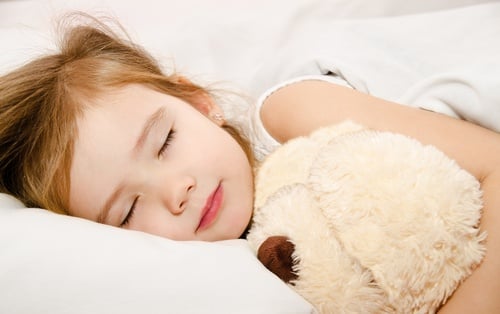7 Painless Sleep Hacks All Parents Should Use To Get Kids To Bed
Getting children to sleep at night can be tiresome. Even when you’ve set a good routine and they’ve had a long energy-sapping day, it can still be a burden. There are many factors that contribute to successfully putting kids to sleep and even if you hit the nail on the head you can be in for a surprise.
As mentioned in ParentalQuestions, young children go through a variety of developmental changes and this can play havoc with their body clocks, tiredness indicators and general sleeping activity.
To help, we’ve compiled a list of 7 sleeping hacks any parent can adopt to have a more manageable sleeping routine. Remember, not all kids are the same, so try out a few sleeping strategies to find out which one works for you.
Additionally, some children will wake up at night for reasons that are not related to a lack of sleep. Physical pains (like teething for babies) sleep apnea, general fears and anxieties and sleep disorders, all play a part in a healthy sleeping routine.
Sleep Hacks All Parents Should Use To Get Kids To Bed
-
Room temperature
The room your kid sleeps in should be a steady cool temperature to avoid any unwanted heat-related sleep problems. The recommended room temperature for a baby is 16-20 degrees C
Try not to have any open windows that can cause drafts and keep all radiators or power heaters on a set timer, so they don’t overheat the room.
It seems very obvious, but your child’s temperature plays an important role in their sleep quality. Children will wake up more often in summer if they are hot, flustered or are overdressed.
-
Keep the Room Dark
Keep the room dark and only use night lights as a dim spotlight. A general rule is that you should be able to read with the light on, but nothing else.
The dimmer the light the better but try to avoid too much artificial light. Artificial light will excite the ‘game’ side of your kids and will keep their brains activity awake and aware for longer.
-
Limit all screen time before bedtime
Screens before bed can have a direct impact on our sleep. This plays a significant part in getting children to bed at the right time and setting the best sleeping routine.
Blue light can contribute towards poor sleep so it’s best to limit all screen activity for at least 1 hour before bedtime.
All electronic devices affect our body’s biological signals to stay awake. This is increased in young kids who take much longer to wind down.
What about when i’m away from home?
Sometimes this can be difficult, especially if you are away from home and with family or friends. However, try to be firm and stick to this rule.
Many handheld devices have screen limit timers that will automatically shut off at a certain time. These are perfect for kids of all ages and will instantly set the rules before bedtime making this rule much easier for you to adopt.
-
Set a unique sleep routine
Every child should have a sleep routine, and this should be unique to them. If you have older children, then this may differ significantly from younger children who need more time to adjust.
For example, with younger children, try to proactively set a bedtime that takes into consideration their nap times in the day. Then set the bedtime to start at around a 4-5 hour gap after their day time nap.
Once you have measured the start and end time of their daytime nap you can proactively plan their bedtime routine. This will ensure they are naturally more tired and less likely to play up.
Additionally, you can set a routine before bed that signifies it’s “lights out” soon. Small examples like, running a bath, reading a story or playing a low brain activity game (like a puzzle) will work well for kids of all ages.
Furthermore, try adopting a unique bedtime story that you always read or a bedtime “buddy” that your child brings with them to bed to help.
5. Background Noise (White Noise)
Many kids sleep with a variety of white noise sounds in the background to help them transition from a lighter sleep into deeper ones. It works to soothe children of all ages, but especially those that are really young.
It’s a great way to keep their brain waves steady while they sleep and can aid in their ability to self soothe. Besides the general benefits of white noise, it can also help to reduce background noise from other rooms that could cause a problem.
White noise can come in all forms and we recommend trying water sounds or rain sounds as the perfect natural lullaby.
-
Avoid caffeine and heavy meals before bed
Caffeine is a stimulant and will have the opposite effect on children and bedtime. It’s not good for children, in general, but can have terrible consequences on relaxation and helping to ease their minds.
If you do choose to give your children soft drinks, ensure they don’t have anything containing sugar or caffeine at least 3 hours of bedtime. This will help to avoid unnecessary confusion in the brain as the sugar fights to keep it active.
Heavy meals are also not recommended either, but if your child is hungry a light snack or fruit should do the trick. Alternatively, a warm cup of milk can help to soothe feelings of hunger in the evening.
-
Don’t set later bedtimes, set early ones!
Many parents assume that by having later bedtimes their child will fall asleep faster. This is not true. Most children who go to sleep earlier, sleep for longer and wake up fewer times.
Although general bedtimes are age dependant, putting any child to bed past their sleep window will cause their body to produce more cortisol and adrenaline which prevents them from sleeping.
This has the undesired effect of stimulating the body and keeping your child up for longer as your child battles natural tiredness with increased hormonal activity.
This is commonly referred to as the “second wave” and you’ll notice it if your child stays up past their bedtime then suddenly gets a wave of energy.
What about sleep disorders?
Sometimes you can try everything but your kid just will not go to sleep. If you’ve established a bedtime routine and made unique modifications to fit your child’s needs but they are still having problems sleeping, your child may have a sleep disorder.
If you presume that your kid may have a sleep disorder, talk with your child’s pediatrician. They will go over their sleep habits and find out more information on what is causing the problems
Remember, If you want to get your kids to sleep fast they need to be tired. The more active they are in the day the more rest and recuperation they will need at night.
Being outside in the daytime will also stimulate the hormones to reduce stress and facilitate better sleep at night.
It’s always advisable to sit down and talk to your kids, especially if they are a bit older and can easily communicate what the issue is. General fears and phobia all play a role in anxiety levels before bedtime.
Try to explore all the options on whether or not your child needs an extra hand before bedtime and then implement some of the strategies above to help them fall asleep peacefully.
Alaska Sleep Clinic not only does sleep studies on children of all ages; but our Pediatric Medical Director is a pediatric cardiologist specializing in sleep. Call Alaska Sleep Clinic today @ 907-420-0540 for a free consultation in-lab or through telemedicine.
Click the picture below to download our FREE Pediatric Sleep Studies E-book.
Author Bio: Mo Mulla is a work from home dad who enjoys reading and listening to music. He loves being a dad and husband to a growing family. He loves writing about his passions and hopes to change the world, 1 blog post at a time! You can find his parenting blog here: ParentalQuestions.com




